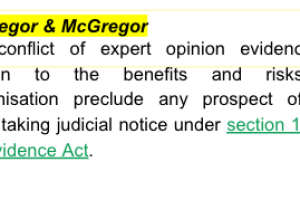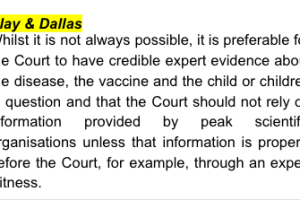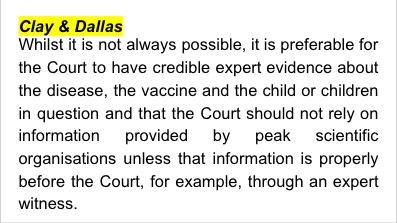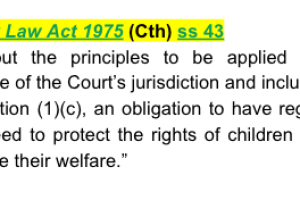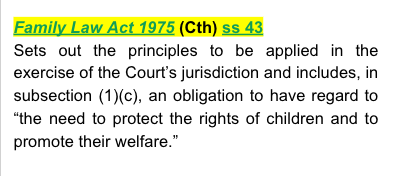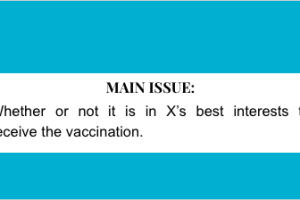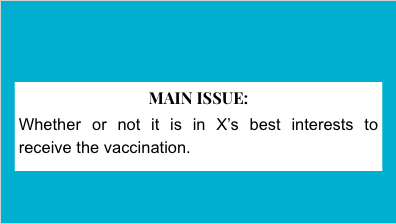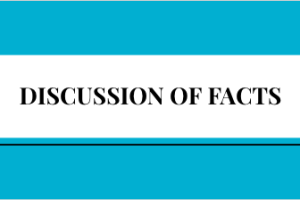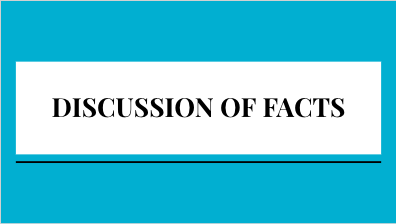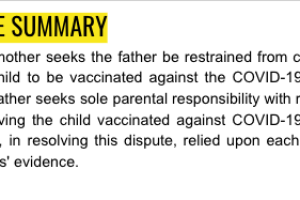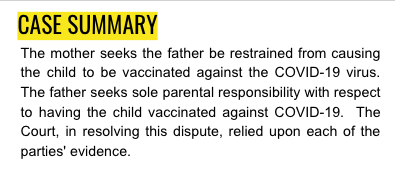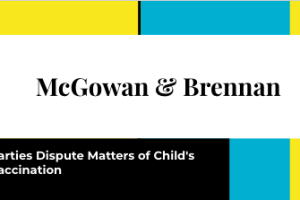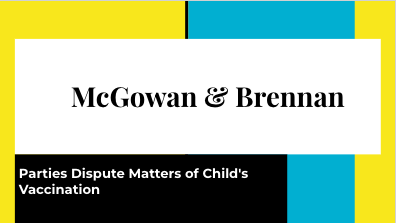- · 4622 friends
Parties Dispute Matters of Child's Vaccination

McGowan & Brennan [2022] FedCFamC2F 1082 (17 August 2022)

The mother seeks the father be restrained from causing the child to be vaccinated against the COVID-19 virus. The father seeks sole parental responsibility with respect to having the child vaccinated against COVID-19. The Court, in resolving this dispute, relied upon each of the parties' evidence.

Facts:
This case concerns the discrete issue as to the vaccination of the child of the parties, X born 2012 ("X") against the COVID-19 virus. X is currently nine years of age. The mother commenced proceedings in respect of X under part VII of the Family Law Act 1975 (Cth) (“the Act”) on 21 April 2022 pursuant to the COVID-19 List procedures of the Court. She sought that the father be restrained from causing or permitting X from receiving any further doses of the vaccination against the COVID-19 virus. The father also seeks an Order for sole parental responsibility about all major long term decisions about X’s health generally.
The mother is concerned about the safety of the COVID-19 vaccine for children. She is not opposed to vaccinations per se, having facilitated X’s vaccinations against a range of childhood illnesses. She is, however, concerned that the COVID-19 vaccine is novel and that there is limited clinical data to support a conclusion that the vaccine is sufficiently safe and efficacious for children. Her contention relating to X is that the risks of the vaccine are not justified at present when compared to the risk to him of disease.
The father is concerned about the safety of X if he is not vaccinated. He contends that COVID‑19 is a real and present threat to X’s health and that of other members of his household and the community at large. The father acknowledges that the vaccines carry risks, but contends that the Australian Technical Advisory Group on Immunisation (“ATAGI”) and other public health agencies have weighed this risk in their assessment and ultimately recommend that children aged five to 11 years should receive the vaccine.

Issue:
Whether or not it is in X’s best interests to receive the vaccination.
Applicable law:
Evidence Act 1995 (Cth) ss 144(1) - provides that proof is not required about knowledge that is not reasonably open to question.



Analysis:
The ultimate conclusions of Dr B, the evidence relied upon by the mother, is that there is a statistically or virtually nil risk of serious COVID-19 in general affecting children aged 5 to 11 years – there seems to be little benefit to be gained by vaccinating these children. But there is a clear and significant risk of serious adverse effects including myocarditis, pericarditis and death in this age group following gene-based COVID-19 vaccination as well as other serious adverse effects.
ATAGI concluded that COVID-19 vaccines carry with them a risk of harm to the recipient. However, the information provided by these reputable Australian organisations indicates that, as a general proposition, the risks are significantly outweighed by the benefits.
ATAGI’s conclusions are consistent with the opinions of the Federal and State health authorities, upon which the father relies. The Court cannot find a link between Dr B's conclusion that the risk of death due to COVID-19 is “exceedingly rare to virtually nil” and his contention that the assessment of risk of death in children due to COVID-19 is “tenuous” having regard to the lack of information.
The risk to X from receiving the vaccine is uncertain. The available data, which pre-dates the Omicron variant, suggests a reduction of COVID-19 within the age cohort
In circumstances where the COVID-19 vaccine is, according to the mother’s own expert, an “unprecedented” category of therapy and thus expected to take more than 12 years to develop, there is no evidentiary foundation for the submission that, by the time X attains the age of 14 years, there will be adequate data to demonstrate the safety and efficacy of the vaccine.
Conclusion:
Except as otherwise agreed between the parties in writing, the father is permitted to cause the child to receive all vaccinations against the COVID-19 virus as recommended by the Australian Technical Advisory Group on Immunisations for children aged five to 11 years of age.
The father must notify the mother of the date, time and place that any vaccination of X against the COVID-19 virus is to occur at least seven days in advance of such appointment. The father must notify the mother in writing and provide her with a copy of any vaccination certificate or other document recording X’s COVID-19 vaccination within 24 hours of any such vaccination occurring.
The mother’s Application for Costs against the father filed 10 August 2022 be dismissed. Within 28 days from the date of these Orders, the father shall pay the sum of $1,650 to Legal Aid NSW on account of his contribution to the costs of the Independent Children’s Lawyer with respect to the defended hearing.


